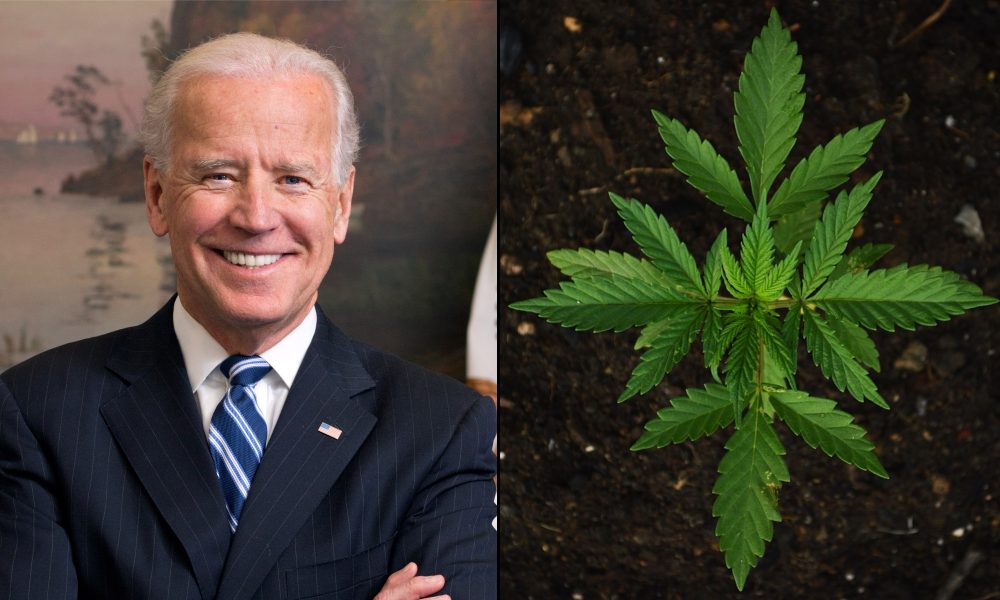Speaking at an event commemorating the end of Black History Month on Monday, President Joe Biden again touted his move to pardon people for marijuana—highlighting the racially disparate impact of cannabis enforcement.
“Another thing about equal justice. I’m keeping my promise: No one should be in prison for the mere possession of marijuana,” the president said. “Too many minorities are in prison for that.”
“So, what I’ve passed—we should pardon them, expunge their records as if it never happened so they have a chance again in society,” he said.
Separately, the White House highlighted the cannabis policy actions took last year—including the pardons proclamation as well as the review into marijuana’s federal scheduling status that he directed—in a new fact sheet on the administration’s moves to advance “equity and opportunity for Black Americans and communities across the country.”
“The President took bold action to address our failed approach to marijuana. The criminalization of marijuana possession has upended too many lives—for conduct that is now legal in many states,” it says. “While white, Black, and brown people use marijuana at similar rates, Black and brown people are disproportionately arrested, prosecuted and convicted for it.
His pardon action “lifts barriers to housing, employment, and educational opportunities for thousands of people with those prior convictions,” the fact sheet says, nothing that the president also called on governors to follow suit at the state level.
While Biden’s mass pardon covers people who have committed non-violent federal cannabis possession offenses at the federal level and under Washington, D.C. law, it did not free anyone who is currently incarcerated and excludes people who were convicted of selling cannabis, among other groups that advocates would like to see get relief. And despite the president seemingly conflating pardons and expungements in his recent and prior remarks, those are two separate processes.
Cannabis reform activists have also expressed frustration that the Department of Justice (DOJ) has still not yet made available application forms for people who wish to obtain certificates demonstrating that they are covered by the pardon proclamation. Pardon Attorney Elizabeth Oyer said in December that the online application would be posted “very soon,” but that has not yet happened.
Biden and White House officials have nonetheless repeatedly highlighted his cannabis actions, often in the context of equity and racial justice.
Earlier this month, for example, the president issued an executive order that touts the administration’s efforts to address the federal government/s “failed approach” to marijuana.
The executive order didn’t specifically build on any administrative cannabis reforms; rather it focused on promoting equity within federal agencies and the White House. But the president took the opportunity to connect the issue back to his marijuana actions.
“My Administration has taken action to strengthen public safety, advance criminal justice reform, correct our country’s failed approach to marijuana, protect civil rights, and stand up against rising extremism and hate-fueled violence that threaten the fabric of our democracy,” Biden said in the order.
The president’s marijuana moves were also mentioned in a White House preview ahead of Biden’s State of the Union address this month, but the president didn’t explicitly raise the issue in the speech itself.
On Martin Luther King Jr. Day, Biden described his cannabis pardons as a reflection of his commitment to “equal justice.”
Also, at the end of last year, the president granted a half dozen additional pardons, including for a handful of people with marijuana or other drug convictions on their records.
Domestic Policy Council Director Susan Rice said in December that the president’s broader cannabis clemency and directive for an administrative review into cannabis scheduling have helped address the country’s “failed approach to marijuana” and represent key parts of the administration’s “remarkably productive year.”
Meanwhile, a bipartisan group of 29 congressional lawmakers from both the House and Senate sent a letter to the president in December, asking that he formally back federal marijuana legalization as the administration carries out the cannabis scheduling review.
While the lawmakers didn’t request that Biden take administrative action to unilaterally facilitate legalization, it does underscore an eagerness among supporters for the White House to play a more proactive role in advancing reform.
U.S. Health and Human Services (HHS) Secretary Xavier Becerra, who was CCed on the letter, tweeted a link to a Marijuana Moment article that discusses the president’s administrative cannabis scheduling directive.
“We’re going to take a look at what science tells us and what the evidence tells us,” Becerra, who has a considerable record supporting cannabis reform as a congressman and as California’s attorney general, said at the recent overdose prevention event. “That will guide what we do—and we hope that will guide what the federal government does.”
Following the president’s October announcement, the secretary said that the department would “work as quickly as we can” to carry out the scientific review. And he’s already discussed the issue with the head of the Food and Drug Administration (FDA) to that end.
Gupta said previously that the president’s action was “historic,” adding that there are “clearly” medical benefits of cannabis.
Like HHS, DOJ has similarly committed to quickly carrying out the separate scheduling review the president directed, which could result in a recommendation to place cannabis in a lower schedule or remove it altogether, effectively legalizing the plant under federal law.
The president also officially signed a marijuana research bill into law in December, making history by enacting the first piece of standalone federal cannabis reform legislation in U.S. history.
A series of polls have shown that Americans strongly support the president’s pardon action, and they also don’t think that marijuana should be federally classified as a Schedule I drug.
Oklahoma GOP Leaders Urge Voters To Reject Marijuana Legalization Measure On Ballot Next Week
Read the full article here









